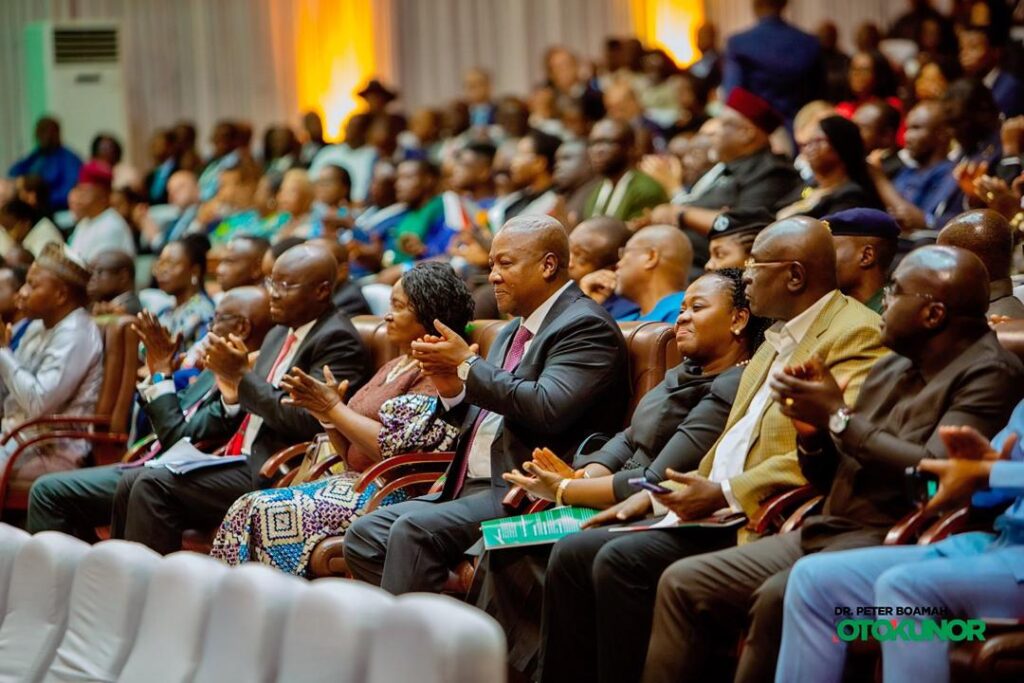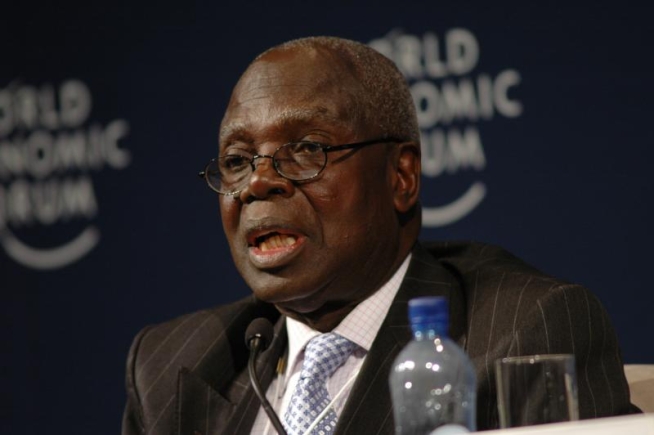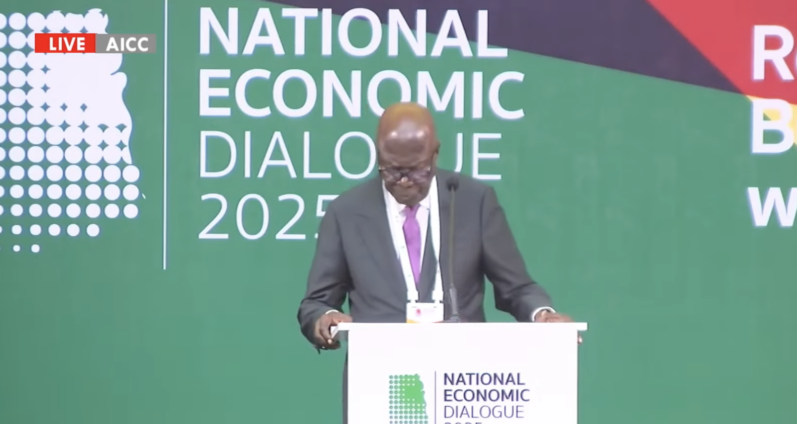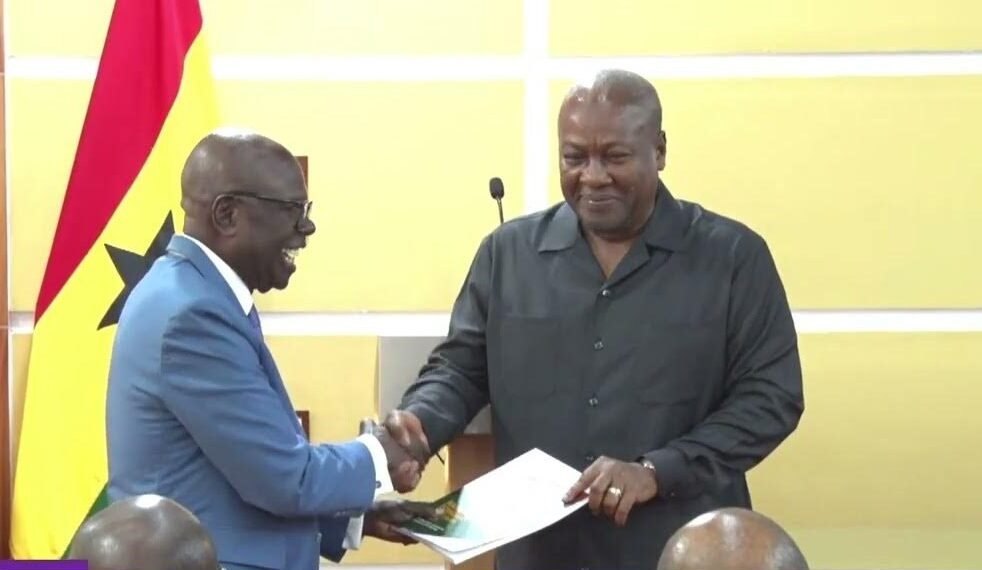The National Economic Dialogue Planning Committee, chaired by renowned economist and statesman Dr. Ishmael Yamson, has presented its final report to President John Dramani Mahama at the Jubilee House.
The report is the culmination of extensive national consultations and technical deliberations held under the auspices of President Mahama’s 120-day social contract with the Ghanaian people.
On March 2, 2025, President Mahama appointed a seven-member planning committee to steer the organisation of a landmark National Economic Dialogue.
The committee’s mandate was clear and urgent: to honestly communicate the true state of Ghana’s economy to stakeholders and citizens, develop a robust homegrown fiscal consolidation programme to guide the national budget, and identify critical structural reforms and policy priorities essential for resetting the nation’s economic trajectory.
“The dialogue, as we have been told, took place on the third and fourth of March this year. The committee secured participation from all key stakeholders, including but not limited to members of political parties, civil society organisations, academia, students, youth organisations, professional bodies, ministers of state, government appointees, and traditional rulers”.
Dr Ishmael Yamson, Chairman of the National Economic Dialogue Planning Committee,
According to Dr. Yamson, the quality and passion of contributions from all sectors reflected a country deeply invested in charting a bold new economic course.

In presenting the report, Dr. Yamson underscored the thematic structure of the dialogue, which focused on six priority areas.
These included restoring macroeconomic stability and resetting confidence in the economy, driving inclusive and sustainable transformation, enabling private sector-led growth, tackling the infrastructure deficit, implementing structural reforms with a focus on energy and cocoa, and strengthening governance, accountability, and anti-corruption measures.
Moral Call to Action
Dr. Yamson remarked that the report’s recommendations offer not just a policy blueprint but a moral call to action at a time when global disruptions demand national resilience through self-reliance.
He further noted with satisfaction that some key recommendations had already been adopted in the 2025 national budget and were being executed with promising outcomes.
Chief among these is the swift and surprising recovery of the Ghanaian cedi against major foreign currencies, a development many had previously deemed unlikely.
“There are legitimate questions about whether the current progress is sustainable, but we are confident that, with continued discipline and adherence to the recommendations outlined, Ghana can maintain macroeconomic stability and become an attractive destination for both local and foreign investment over the medium to long term.”
Dr Ishmael Yamson, Chairman of the National Economic Dialogue Planning Committee
The committee emphasised that the way forward must include an unwavering commitment to reversing the structural imbalances that frequently undermine Ghana’s economic stability. The energy and cocoa sectors, in particular, were identified as needing urgent reform to unlock their full potential.

Citing global best practices, Dr. Yamson observed that countries which have escaped the so-called “middle-income trap” consistently maintain a permanent consultative process involving government, private sector actors, civil society, and international partners.
Such platforms, he argued, are essential for providing timely policy feedback and inputs that help decision-makers recalibrate strategies and institutional frameworks in real time.
“Naturally, the question being asked is whether this is just a blip, and it is a legitimate question because our history is replete with many broken promises; however, Your Excellency, we believe that the progress being made now is sustainable.”
Dr Ishmael Yamson, Chairman of the National Economic Dialogue Planning Committee,
Dr Yamson believes Ghana can create a macroeconomic environment which is stable and a country which is attractive to investors, both local and foreign, over the medium to long term.
What he noted is required is to ensuring that the current drive to reverse some of the fundamental variables that create the macroeconomic instability is sustained.
To this end, the committee has recommended that the National Economic Dialogue be institutionalised and possibly constitutionalised as a permanent consultative mechanism to sustain national economic conversations and accountability.
Dr. Yamson concluded his remarks by acknowledging the pivotal support of the Chief of Staff, Hon. Julius Debrah, and his team of professionals, who were instrumental in ensuring the smooth planning and execution of the dialogue.

He expressed deep gratitude to President Mahama for entrusting the committee with such a critical responsibility and pledged continued support for the successful implementation of the report’s recommendations.
The presentation of this final report marks a significant milestone in Ghana’s journey toward economic renewal under President Mahama’s administration.
Whether the nation seizes this opportunity to reset and rebuild will depend not only on presidential will, but also on a collective commitment to sustained reform, strategic execution, and inclusive growth.
READ ALSO: Mahama Rallies Support for ESLA Increase, Assures Prudent Use, Stable Power Supply



















